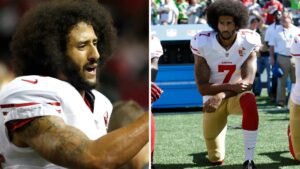Today, Kaepernick is not only out of the NFL but reportedly facing financial troubles, even falling short of qualifying for a pension from the league he once sought to change from within.
Kaepernick’s rise was meteoric. Drafted by the San Francisco 49ers, he became a star quarterback, leading the team to the Super Bowl in the 2012 season. But it was his 2016 decision to kneel during the national anthem that changed everything. His protest sparked a nationwide debate about patriotism, race, and freedom of speech.

The NFL’s Response and Kaepernick’s Career Decline
Following his protests, Kaepernick’s NFL career took a sharp downturn. Despite a strong track record, he was not signed by any team after the 2016 season. Many experts and insiders believe the league effectively blacklisted him for his activism.
This blacklisting kept him out of the league during what could have been his prime years, limiting his opportunities to earn a stable income through football. His absence from the field also affected his eligibility for the NFL pension system.
Financial Troubles and Lawsuits
Outside the field, Kaepernick’s financial situation has reportedly been challenging. While his activism brought lucrative endorsement deals initially, many of those dried up as the controversy around him grew.
Moreover, he spent significant resources on legal battles against the NFL, alleging collusion to keep him out of the league. Though the two sides reached a confidential settlement in 2019, the legal costs and loss of steady income from football have impacted his finances.

Some reports suggest Kaepernick has faced financial strain, though details remain private. Regardless, his story underscores how activism in professional sports can come at a steep personal cost.






